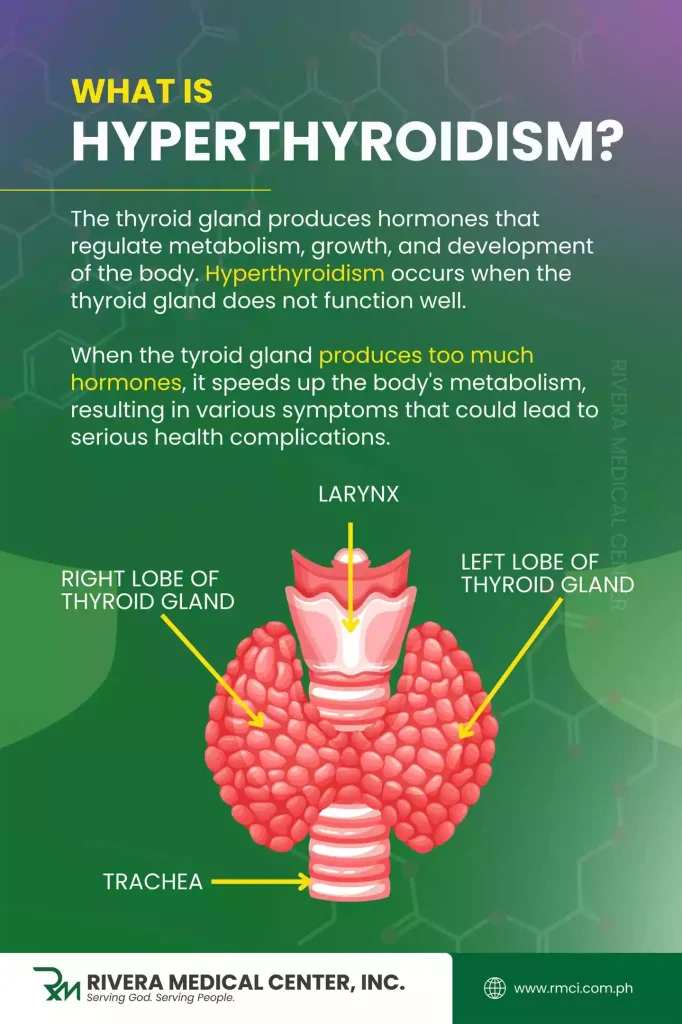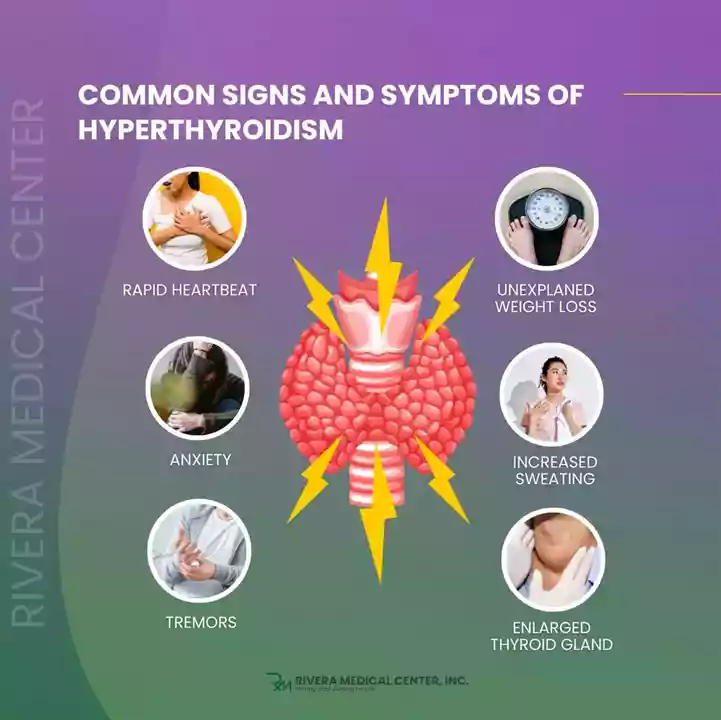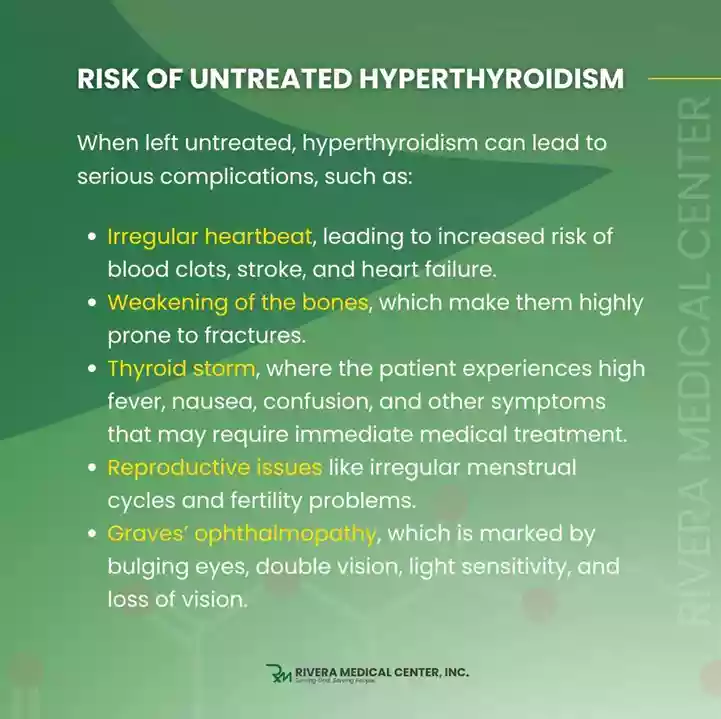Hyperthyroidism in the Philippines: Causes, Signs, and Risk Factors
Hyperthyroidism in the Philippines is a significant endocrine disorder.
Those with hyperthyroidism have an excess of thyroid hormones in the bloodstream, commonly referred to as an “overactive thyroid.” This condition affects multiple organ systems, leading to a range of symptoms that can substantially impact your quality of life in Davao and Panabo City.
What Is Hyperthyroidism?
The thyroid gland is the small butterfly-shaped organ at the base of the neck. Hyperthyroidism happens with the thyroid produces and releases abnormally high amounts of hormones. these hormones are the triiodothyronine (T3) and thyroxine (T4).
These hormones play an essential role in regulating the body’s metabolism. These hormones affect the heart rate, energy levels, and overall organ function.
What are the Causes of Hyperthyroidism in the Philippines?
Several conditions can lead to the overproduction of thyroid hormones. The primary causes include:
- Graves’ Disease: The most common cause, accounting for up to 70–80% of cases in the Philippines and around the world is Graves’ disease. This disease is an autoimmune disorder. The body’s immune system attacks the thyroid gland and forces it to stimulate excessive hormone production.
- Toxic Adenoma and Multinodular Goiter: These refer to nodules or lumps in the thyroid gland that become autonomous. They produce excess hormones independent of normal regulatory mechanisms.
- Thyroiditis: Inflammation of the thyroid gland (from autoimmune conditions, viral infections, or other causes) leads to the leakage of stored thyroid hormone. It results in temporary hyperthyroidism.
- Excessive Iodine Intake: High intake of iodine (from diet or medication) can also trigger hyperthyroidism. This happens in individuals with pre-existing thyroid nodules.
- Overmedication with Thyroid Hormone: Patients treated for hypothyroidism may sometimes develop hyperthyroidism if the replacement dose of thyroid hormone is too high

Signs and Symptoms of hyperthyroidism
The signs and symptoms of hyperthyroidism varies, depending on its case. But there are common symptoms, which include:
- Nervousness, anxiety, and irritability
- Weight loss despite increased appetite
- Rapid or irregular heartbeat (palpitations)
- Tremors or shaky hands
- Increased sweating and heat intolerance
- Fatigue and muscle weakness (especially in upper arms and thighs)
- Goiter (enlarged thyroid gland)
- Difficulty sleeping and insomnia
- Frequent bowel movements or diarrhea
- Light or absent menstrual periods (in women)
- Thinning hair and brittle nails
- Bulging eyes (notably in Graves’ disease)
- Increased sensitivity to bright light
- Confusion or poor concentration (more common in elderly patients)

These symptoms can range from mild to severe. When left untreated, hyperthyroidism can result in serious complications. These can include thyroid storm and atrial fibrillation. Other complications are heart failure, osteoporosis, and vision loss.
What are the Risk Factors of Hyperthyroidism in the Philippines?
Certain groups or individuals in the Philippines are at higher risk for developing hyperthyroidism, including:
- Family History: Especially those with relatives who have Graves’ disease or other thyroid disorders.
- Personal History of Chronic Illnesses: Including pernicious anemia or primary adrenal insufficiency.
- Recent Pregnancy: Postpartum thyroiditis can cause transient hyperthyroidism.
- Women: Hyperthyroidism is much more common among women than men.
- Ages 20 to 40: Incidence peaks in early to middle adulthood.
- Iodine Intake: Both iodine deficiency and excess can predispose individuals to thyroid dysfunction.
These numbers show that hyperthyroidism is a common problem. If not addressed, it can also become a serious health issue in both Davao, Panabo City.

Condition of Hyperthyroidism in the Philippines
Hyperthyroidism and thyroid dysfunction are important public health concerns in the Philippines. Here is data from available studies online:
- A 2012 study, published in the Journal of the ASEAN Federation of Endocrine Societies, found that the national prevalence of thyroid dysfunction among adults is 8.53%, with subclinical hyperthyroidism as the most predominant form (5.33%) and overt hyperthyroidism (the “real” form) at 0.61%. As of writing, there is no existing study about thyroid dysfunction from 2012 onwards.
- A 2013 data from the National Nutrition Survey revealed that around 5.8 million Filipinos have thyroid dysfunction. No recent data from credible sources exists to describe the state of thyroid dysfunction in the Philippines, Davao Region, or in Panabo City.
Conclusion: Thyroid health for Davao and Panabo City
Hyperthyroidism is a complex and potentially serious condition with diverse causes, notable risk factors, and a spectrum of clinical presentations.
Despite the lack of data, hyperthyroidism remains a significant health concern in the Philippines—including Davao Region, and in Panabo City. Early identification and treatment of thyroid problems are essential to prevent complications. If you are in Davao Region or in Panabo City, and have risk factors that can lead to hyperthyroidism, visit Rivera Medical Center to consult with our endocrinologist.
Sources: ASEAN Endocrine Journal, World Health Organization (WHO), Philippine Department of Health (DOH), National Institutes of Diabetes and Digestive and Kidney Diseases, Medline Plus, Philippine News Agency (PNA)




